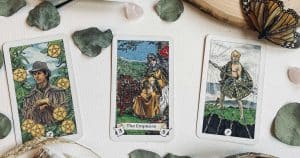Since the dawn of mankind, people worldwide have possessed unique and profound emotional and psychic gifts. While some of them have yet to be explained by science, it has not stopped people from expressing continued belief and interest in their presence. While mankind turned to spiritual and cosmic explanations of these gifts in ancient times, modern developments in psychology have further explored these concepts. Modern psychology, which has advanced significantly in the previous hundred years, has dove into the psyche, behavior, and emotions of who we are as people. Empathy is one particular aspect of human beings that can be remarkably deep—and powerful. If you’d like to learn even more, be sure to book with one of our intuitive empath specialists at Keen.com!
What is empathy?
Empathy, as defined by Dictionary.com, is “the psychological identification with or vicarious experiencing of the emotions, thoughts, or attitudes of another” and “the imaginative ascribing to an object, as a natural object or work of art, feelings or attitudes present in oneself.” All human beings are technically capable of expressing and feeling empathy, even though some people may be more prone to experiencing it than others. Empathy has been tied to emotional awareness and innate sensitivity, which can be tied to both genetic predisposition as well as one’s past experiences. In this sense, empathy grows during one’s life span from a mix of nature and nurture.
Who is an empath? Are all empaths intuitive?
According to modern definitions, an empath is someone who is particularly sensitive to the emotions and energies of other people or their surroundings. Empaths can be truly naturally born or instead work on developing these skills and attributes. Modern classifications of empaths include physical empaths, emotional empaths, and intuitive empaths. However, it is important to note that there is no scientific evidence at present moment that confirms the difference in these classifications. Scientifically and psychologically, empaths are individuals with heightened emotional insight, perception, and awareness.
Physical empaths are individuals who sense things and feel these sensations within their bodies. For instance, this could be an individual who “picks up” the symptoms or pain of another individual and believes they feel it similarly.
Emotional empaths pick up on the feelings and emotions of others rapidly and can become overwhelmed by them.
What are intuitive empaths? Is intuitive empathy real?
Intuitive empaths are individuals who are stated to have heightened intuition, allowing them to be capable of psychic phenomena, as well as receiving messages from their surroundings, people, plants, and animals telepathically. They then use these stimuli to guide themselves and others. However, because current science cannot measure intuitive empathy empirically, it is still not backed up my facts.
What are traits of an intuitive empath? Who is an intuitive empath?
Have you ever walked into a room and instantly felt the energy and emotions of someone you know—or even someone who you’re meeting for the very first time? Have you ever been able to simply “read” someone even before communicating? Have you ever been told you’re “too sensitive” and that you need to build a “thick skin?” Or even that you need to “toughen up?” Have you ever felt like you are a sponge and absorb the energy and vibes around you, regardless if you want to or even trying? Then, on paper, you may display the traits of an intuitive empath.
Are intuitive empaths rare? Is being an intuitive empath genetic?
From an esoteric and spiritual perspective, being an intuitive empath is extremely rare. This is because of the synergy between emotion, spiritual openness, sensitivity, perception, and awareness. While one’s genetics can reveal who may have a predisposition to being more emotionally sensitive or reactive, these are only a few factors that can lead someone to becoming one. So no—intuitive empathy is not genetic.
Is being an intuitive empath good?
While intuition and intuitive awareness to one’s environment can be exceptionally beneficial for decision-making responses, scientists are still uncertain how this trait was evolved within humanity. Some historians and scientists propose the idea that intuition functions on an unconscious level to promote protection as one navigates their environment.
However, exhibiting sensitivity—or hypersensitivity—can leave one open to stimuli, regardless of one’s consciousness. This can leave an individual unnecessarily open and vulnerable to others and the energies around them. Many intuitive empaths are required to learn to navigate this sometimes confusing realm until they are able to establish healthy and strong boundaries that only allows them to pick up the frequencies that they wish to. Sometimes, depending on how sensitive one may be, they may at times be overwhelmed by the energetic forces around them, which can be paralyzing, traumatic, or painful. Intuitive empathy is not labeled as “good or bad,” but an individual may choose to label it however they feel when experiencing the heightened sensitivity. Because these experiences may be very draining, one might require exceptional time to recharge more than other individuals. Extreme self-care may be needed and should be taken.
What are some signs that you are an intuitive empath? What can intuitive empaths do?
When seeking to understand your own level of intuitive empathy, we have compiled a list of possible signs.
1. You have some form of clairvoyant ability.
While there are many forms of clairvoyant ability, your intuition may manifest as one of the following. Clairaudience is hearing voices. Clairvoyance is seeing images. Clairsentience is recognizing feelings. Claircognizance is simply “knowing.”
2. You have a highly developed “gut instinct” that is often correct.
When it comes to life, we often experience a feeling within us that can spurn us to make choices. Examples of this can be feeling “butterflies” when something is positive for you or “feeling sick to your stomach” when something is negative for you.
3. You can be overstimulated easily.
Often, intuitive empaths are more prone to introverted tendencies. This is because they can find environments around them particularly chaotic and disruptive when there is not a sense of harmony.
4. You may experience unexplained feelings and sensations.
When connecting with another person or environment’s energetic field, you may pick up the vibrations of that force intensely.
How do you become an intuitive empath?
If you are seeking to become an intuitive empath, there are a few things you can do to exercise this skill. Just like one goes to the gym to build muscle, you must work to increase your perception, awareness, and sensitivity.
The first and greatest tool to doing this is to use meditation and reflection. Becoming able to turn within and honestly recognize the emotions you are feeling—apart from others—will better help you to label them when they appear to be coming from an outside person, environment, or force.
Next, focus on compassion. Developing this skill can be done by putting yourself in other people’s perspectives, regardless of your own. By viewing the world, their experiences, and their lives through the lens of “the other,” you are better able to be conscious of their motivations, decisions, and worldview. Doing this without criticism or judgment is especially important.
Last, sharing and communicating your feelings and emotions with others—even in the form of a journal—can help document one’s experiences. By leading with a heart-first approach, not only will you be able to further build your relationships and receptivity, but you will grow as a human being. Going to therapy or talking with a therapist, counselor, spiritual guru, or mentor can also be invaluable.
Can you hire an intuitive empath?
Throughout the world, spiritual practitioners do offer intuitive empathy readings. Here at Keen.com, we offer readings with gifted intuitive empaths who can not only explain what you are feeling, but to help guide you in your life’s direction. Working with a skilled intuitive empath can also help you to develop the skills on your own. Book a session today!












